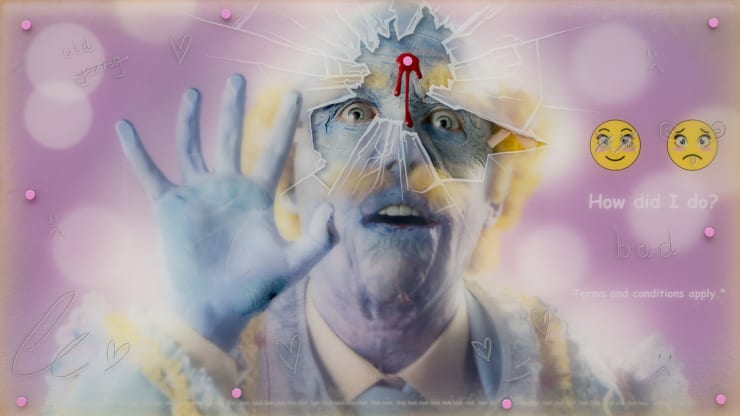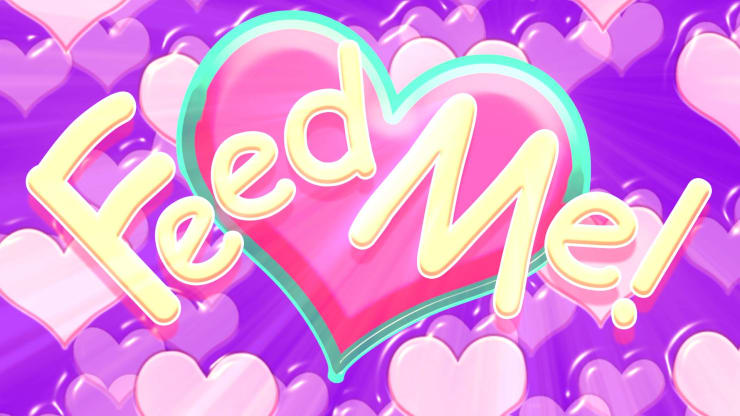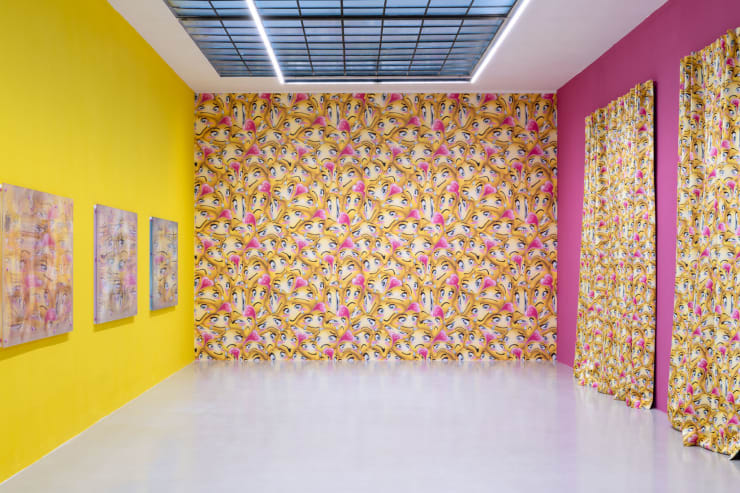Rachel Maclean | i'm 2 happy!
Look sweetheart. None of this is real.
It's just a game that the grown-ups are playing.
All you gotta do is play along.
OK?
The game is late-stage capitalism, and its appetite is insatiable. Consume or be consumed. Feed yourself, and your dreams. Achieve true happiness by sustained success. Rate yourself, and survey everything you purchase and consume, so we can continue improving and innovating. If there was a symbol for this era, it might be the smiley face. In Rachel Maclean’s work, wide-eyed, rosy-cheeked smiley faces unnerve in how saccharinely they radiate the cyclical violence of consumerism.
But why do we keep making new products?
Why do we keep innovating? I'll tell you why.
Because we realise that success is just temporary.
You get hungry, but you've just eaten.
Right?
The exhibition is part of the gallery festival with international curators in Vienna curated by
Rachel Maclean (b.1987 in Edinburgh, Scotland) studied Drawing and Painting at Edinburgh College of Art, Scotland, UK and Fine Arts at the School of the Museum of Fine Arts, Boston, USA.
Selected solo exhibitions include: Rachel Maclean, at Kunsthalle zu Kiel, Germany, 2020; Spite Your Face, Tel Aviv Museum of Art, Israel, 2019; Native Animals, Arsenal Contemporary NYC, USA, 2019; Tales of Disunion, Nassauischer Kunstverein, Wiesbaden, Germany, 2019; Make Me Up, Kunsthalle Winterthur, Winterthur, Schwitzerland, 2019; Please, Sir …, Gus Fisher Gallery, University of Auckland, New Zealand, 2018; The Lion and The Unicorn, The National Gallery, London, England 2018/19; Rachel Maclean, KWM Arts Centre, Beijing, China, 2018/19; Just B Yourself, Dublin City Art Gallery, Dublin, 2018; New Worlds, State of Concept, Athens, Greece, 2018; Rachel Maclean, National Gallery of Australia, Canberra, 2018; Spite Your Face, Scotland + Venice, Representing Scotland at the Venice Biennale, 2017.
-
 Rachel MacleanHow did I do? Bad, 2021Digital print on acrylic200 x 113 cm
Rachel MacleanHow did I do? Bad, 2021Digital print on acrylic200 x 113 cm
78 3/4 x 44 1/2 in -
 Rachel MacleanHow did I do? Crap, 2021Digital print on acrylic200 x 113 cm
Rachel MacleanHow did I do? Crap, 2021Digital print on acrylic200 x 113 cm
78 3/4 x 44 1/2 in -
 Rachel MacleanHow did I do? Fuck u!, 2021Digital print on acrylic200 x 113 cm
Rachel MacleanHow did I do? Fuck u!, 2021Digital print on acrylic200 x 113 cm
78 3/4 x 44 1/2 in -
 Rachel MacleanHow did I do? Shit, 2021Digital print on acrylic200 x 113 cm
Rachel MacleanHow did I do? Shit, 2021Digital print on acrylic200 x 113 cm
78 3/4 x 44 1/2 in -
 Rachel MacleanGerms, 20133 min Colour video installation, with sound
Rachel MacleanGerms, 20133 min Colour video installation, with sound
Edition of 10, 7 available -
 Rachel MacleanFeed Me, 20151 hour Colour video installation, with sound
Rachel MacleanFeed Me, 20151 hour Colour video installation, with sound
Edition of 6, 1 available
Film Still
Look sweetheart. None of this is real. It's just a game that the grown-ups are playing. All you gotta do is play along. OK?
The game is late-stage capitalism, and its appetite is insatiable. Consume or be consumed. Feed yourself, and your dreams. Achieve true happiness by sustained success. Rate yourself, and survey everything you purchase and consume, so we can continue improving and innovating. If there was a symbol for this era, it might be the smiley face. In Rachel Maclean’s work, wide-eyed, rosy-cheeked smiley faces unnerve in how saccharinely they radiate the cyclical violence of consumerism.
Part of that violence lies in how companies infantilise us to manipulate our decisions. In Feed Me (2015), one of Maclean’s longest and most ambitious films to date, society’s simultaneous infantilisation and sexualisation of women is portrayed through the classic fairytale story between beast and young girl. In what could be a reworking of the seven deadly sins – pride, greed, wrath, envy, lust, gluttony and sloth – Maclean constructs an entire world encrusted with prosthetics and crystallised by hairspray, at once slick, shiny, cute, and dirty, seedy, dripping with disgust. In its artifice, theatricality, playful irony and exaggeration, the work oozes camp, and yet at the same time its dark humour criticises the very thing it portrays.
Maclean conceives, designs and acts all of the characters herself, using actors for the voices, which she then lip-syncs. Part-musical, part-fable, Feed Me features a cast of humans and beasts often in interchangeable roles – demonstrating the hypocrisy of a society that is quick to demonise men accused of paedophilia as monsters, but continues to sexualise young girls. Doomed to fail, traps are set for young women who must simultaneously prove both their innocence and their allure. In Feed Me, Maclean’s characters speak in hyperbolic language reminiscent of overachievement and marketing platitudes: they proclaim that they’re too happy, and are constantly striving for 110%. Festooned with curtains, glittery carpet, and a series of new digital prints, the gallery is similarly too much, a hyper-sensation of both cuteness and absurdity.
Installed near the entrance, Maclean’s 2013 film Germs takes on a new layer of meaning in our post-pandemic world. Her army of invasive, giggling bacteria seem adorably harmless at first, yet quickly our self-protection becomes commodified, killing not just the germs but also ourselves. Our self-imaging – through the internet, through advertising – has siphoned off to the economy every part of our bodies, and, in Maclean’s parallel universe, even our souls. There are times in her films when you see the edge of her costumes: the seam of the prosthetics, the wig cap, the layers of makeup embedded in fake wrinkles. Her characters are all the more grotesque in their unravelling – no longer just monstrous versions of ourselves, but also melting and breaking before our eyes.
But why do we keep making new products? Why do we keep innovating? I'll tell you why. Because we realise that success is just temporary. You get hungry, but you've just eaten. Right?
Rachel Maclean (b.1987 in Edinburgh, Scotland) studied Drawing and Painting at Edinburgh College of Art, Scotland, UK and Fine Arts at the School of the Museum of Fine Arts, Boston, USA.
Selected solo exhibitions include: Rachel Maclean, at Kunsthalle zu Kiel, Germany, 2020; Spite Your Face, Tel Aviv Museum of Art, Israel, 2019; Native Animals, Arsenal Contemporary NYC, USA, 2019; Tales of Disunion, Nassauischer Kunstverein, Wiesbaden, Germany, 2019; Make Me Up, Kunsthalle Winterthur, Winterthur, Schwitzerland, 2019; Please, Sir …, Gus Fisher Gallery, University of Auckland, New Zealand, 2018; The Lion and The Unicorn, The National Gallery, London, England 2018/19; Rachel Maclean, KWM Arts Centre, Beijing, China, 2018/19; Just B Yourself, Dublin City Art Gallery, Dublin, 2018; New Worlds, State of Concept, Athens, Greece, 2018; Rachel Maclean, National Gallery of Australia, Canberra, 2018; Spite Your Face, Scotland + Venice, Representing Scotland at the Venice Biennale, 2017.
-

Installation View, Rachel Maclean, i'm 2 happy!, curated by Phoebe Cripps, 2021
-

Installation View, Rachel Maclean, i'm 2 happy!, curated by Phoebe Cripps, 2021
-

Installation View, Rachel Maclean, i'm 2 happy!, curated by Phoebe Cripps, 2021
-

Installation View, Rachel Maclean, i'm 2 happy!, curated by Phoebe Cripps, 2021
-

Installation View, Rachel Maclean, i'm 2 happy!, curated by Phoebe Cripps, 2021
-
 Rachel MacleanInstallation View, 2021i´m 2 happy! curated by Phoebe Cripps
Rachel MacleanInstallation View, 2021i´m 2 happy! curated by Phoebe Cripps -
 Rachel MacleanInstallation View, 2021i´m 2 happy! curated by Phoebe Cripps
Rachel MacleanInstallation View, 2021i´m 2 happy! curated by Phoebe Cripps -
 Rachel MacleanInstallation View, 2021i´m 2 happy! curated by Phoebe Cripps
Rachel MacleanInstallation View, 2021i´m 2 happy! curated by Phoebe Cripps -
 Rachel MacleanInstallation View, 2021i´m 2 happy curated by Phoebe Cripps
Rachel MacleanInstallation View, 2021i´m 2 happy curated by Phoebe Cripps -
 Rachel MacleanInstallation Viewi´m 2 happy! curated by Phoebe Cripps
Rachel MacleanInstallation Viewi´m 2 happy! curated by Phoebe Cripps -
 Rachel MacleanInstallation View , 2021i´m 2 happy! curated by Phoebe Cripps
Rachel MacleanInstallation View , 2021i´m 2 happy! curated by Phoebe Cripps -
 Rachel MacleanInstallation View, 2021i´m 2 happy! curated by Phoebe Cripps
Rachel MacleanInstallation View, 2021i´m 2 happy! curated by Phoebe Cripps -
 Rachel MacleanInstallation View, 2021i´m 2 happy! curated by Phoebe Cripps
Rachel MacleanInstallation View, 2021i´m 2 happy! curated by Phoebe Cripps -
 Rachel MacleanInstallation View, 2021i´m 2 happy! curated by Phoebe Cripps
Rachel MacleanInstallation View, 2021i´m 2 happy! curated by Phoebe Cripps -
 Rachel MacleanInstallation View, 2021i´m 2 happy! curated by Phoebe Cripps
Rachel MacleanInstallation View, 2021i´m 2 happy! curated by Phoebe Cripps -
 Rachel MacleanInstallation View, 2021i´m 2 happy! curated by Phoebe Cripps
Rachel MacleanInstallation View, 2021i´m 2 happy! curated by Phoebe Cripps -
 Rachel MacleanInstallation View, 2021i´m 2 happy! curated by Phoebe Cripps
Rachel MacleanInstallation View, 2021i´m 2 happy! curated by Phoebe Cripps -
 Rachel MacleanInstallation View, 2021i´m 2 happy! curated by Phoebe Cripps
Rachel MacleanInstallation View, 2021i´m 2 happy! curated by Phoebe Cripps -
 Rachel MacleanInstallation View I, Rachel Maclean, i'm 2 happy!, curated by Phoebe Cripps, 2021
Rachel MacleanInstallation View I, Rachel Maclean, i'm 2 happy!, curated by Phoebe Cripps, 2021 -
 Rachel MacleanInstallation View II, Rachel Maclean, i'm 2 happy!, curated by Phoebe Cripps, 2021
Rachel MacleanInstallation View II, Rachel Maclean, i'm 2 happy!, curated by Phoebe Cripps, 2021 -
 Rachel MacleanInstallation View III, Rachel Maclean, i'm 2 happy!, curated by Phoebe Cripps, 2021
Rachel MacleanInstallation View III, Rachel Maclean, i'm 2 happy!, curated by Phoebe Cripps, 2021 -
 Rachel MacleanInstallation View IV, Rachel Maclean, i'm 2 happy!, curated by Phoebe Cripps, 2021
Rachel MacleanInstallation View IV, Rachel Maclean, i'm 2 happy!, curated by Phoebe Cripps, 2021 -
 Rachel MacleanInstallation View V, Rachel Maclean, i'm 2 happy!, curated by Phoebe Cripps, 2021
Rachel MacleanInstallation View V, Rachel Maclean, i'm 2 happy!, curated by Phoebe Cripps, 2021 -
 Rachel MacleanInstallation View VI, Rachel Maclean, i'm 2 happy!, curated by Phoebe Cripps, 2021
Rachel MacleanInstallation View VI, Rachel Maclean, i'm 2 happy!, curated by Phoebe Cripps, 2021 -
 Rachel MacleanInstallation View VII, Rachel Maclean, i'm 2 happy!, curated by Phoebe Cripps, 2021
Rachel MacleanInstallation View VII, Rachel Maclean, i'm 2 happy!, curated by Phoebe Cripps, 2021































